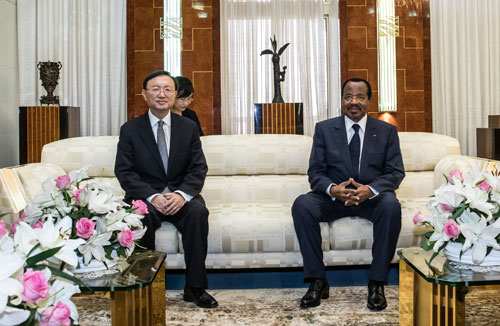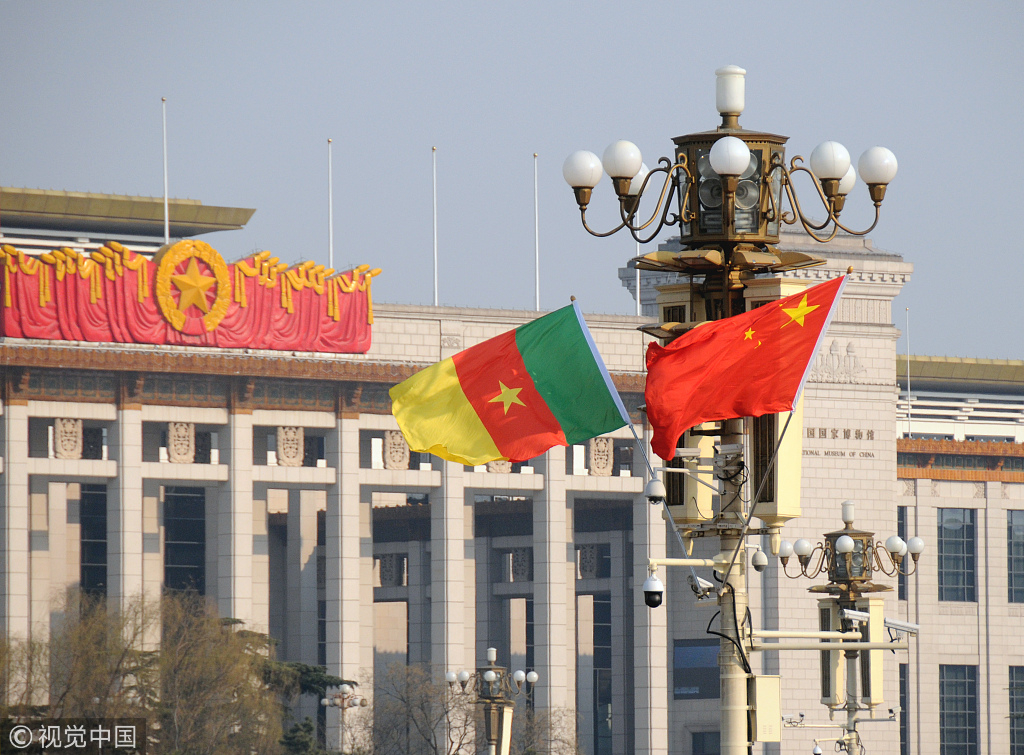
Opinion
14:34, 29-Jan-2019
Opinion: Fake news fails in damaging Sino-African ties
Updated
14:47, 29-Jan-2019
He Wenping

Editor's note: He Wenping is a senior research fellow at the Charhar Institute and a research fellow at the Chinese Academy of Social Sciences. The article reflects the author's opinions, and not necessarily the views of CGTN.
On January 22, news of China cancelling Cameroon's debt made it to the headlines of media outlets around the world, and became a hotly debated topic online. A friend of mine teaching in a Japanese university contacted me via WeChat asking for my opinion and my inbox was full of e-mails sent to me by my African research colleagues overseas.
The reason for the discussion stems from the shocking amount that was being written off. Cameroon owes China as much as 5.2 billion U.S. dollars. The report was first published by the Chinese website of "The Wall Street Journal" and quickly began making the rounds.
In order to convince people to believe the authenticity of the news, the report said that the so-called debt exemption was the major outcome of a meeting on January 18 between Chinese State Council and special representative of Chinese President Xi Jinping, Yang Jiechi and Cameroon's President Paul Biya at the Unity Palace in the capital Yaoundé.
The news immediately triggered concern and even resentment from some Chinese news readers. From their perspective, the figure is unbelievably big and cancelling it had happened in such an easy and simple way.

Chinese State Councilor Yang Jiechi (L) meets with Cameroon's President Paul Biya at the Unity Palace in Yaoundé, Cameroon, January 18, 2019. /MOFA Photo
Chinese State Councilor Yang Jiechi (L) meets with Cameroon's President Paul Biya at the Unity Palace in Yaoundé, Cameroon, January 18, 2019. /MOFA Photo
Though China now is the world's second largest economy and the world's biggest foreign exchange reserve holder, all of this is coming from Chinese people's hard work in the past 40 years. China is still a developing country and there are tens of millions of Chinese people still living under poverty line.
Furthermore, no such arrangement was part of the "Eight initiatives" made during the Beijing Summit of the Forum on China-Africa Cooperation (FOCAC) in September 2018.
The official website of the government of Cameroon and the country's leading newspaper Cameroon Tribune had no coverage of the news that China was erasing Cameroon's debt.
Cameroon Tribune had published several articles titled "Cameroon, China Cooperation Boom", "Cameroon: A Visit to Consolidate Relations" and "Cameroon-China Relations - the Future Is Bright" to cover Chinese State Council Yang Jiechi's visit.
And the country's media reported that following President Biya's visits to China in March and September 2018, bilateral cooperation had become greater and closer.
Yang's visit shows that China pays great attention to further developing its relations with Cameroon.
As for the debt issue, the "Cameroon Tribune" said: "It is within this framework that the perspectives remain rekindled with high hopes concerning the restructuring of Cameroon's debt owed China in conformity with the plea of President Biya during his last visits to China."
Cameroon's interest-free debt to China, according to sources at the Ministry of the Economy, Planning and Regional Development, is today estimated at 45 billion Central African CFA franc (around 78.4 million U.S. dollars).
A source in the Chinese embassy says the interest-free loan contracted by the government of Cameroon from that of China has been canceled by the Chinese government.

National flags of China and Cameroon. /VCG Photo
National flags of China and Cameroon. /VCG Photo
Obviously, the truth is that some form of debt had been cancelled during Chinese State Council Yang Jiechi's visit, but it's not the entirety of the sum. It is Cameroon's interest-free debt to China, and the amount is 78 million U.S. dollars, rather than the shocking 5.2 billion U.S. dollars.
As this is obviously fake news, why did "The Wall Street Journal" publish the story in such a clumsy way? Did they verify their news sources or did they deliberately choose not to?
The answer has yet to be known. But the article was only posted on the Chinese website of "The Wall Street Journal" and not on their English and French platforms.
Maybe they had the intention to irritate Chinese readers and turn their anger towards the Chinese government, and in this way, China-Africa cooperation might not proceed as smoothly as before. Also, the shockingly big amount of debt said to be cancelled might create a Domino Effect that can lure other African countries to following suit and then eventually putting pressure on China.
Western media have been circulating the so-called "China debt-trap" theory lately. If all of a sudden China canceled such a big debt for African countries, what will happen to the debt trap? Of course, they wouldn't slap themselves in the face by publishing such a story.
In short, when going through the news, Chinese readers need to have sharp eyes and a clear mind to separate fake news from the truth.
(If you want to contribute and have specific expertise, contact us at opinions@cgtn.com.)

SITEMAP
Copyright © 2018 CGTN. Beijing ICP prepared NO.16065310-3
Copyright © 2018 CGTN. Beijing ICP prepared NO.16065310-3